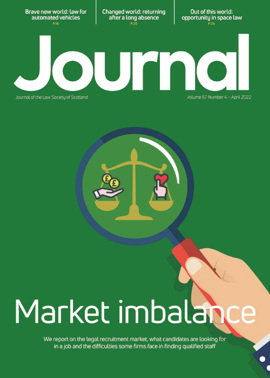Young lawyers flag climate impact

When the skies above Glasgow are blue in March and groups of young people gather for picnics at the park, you hear rumbles that global warming isn’t such a bad thing in Scotland. After all, warmer days and long spells of sunshine can’t be a bad thing, can they?
Well, lawyers from across Europe disagree. No one complained about the pleasant weather at the European Young Bar Association Conference, which was held at the Royal Faculty of Procurators from 24-26 March. But the delegates were there to discuss what might lie behind it – climate change.
Big footprint
The three-day event, organised by the Scottish Young Lawyers’ Association, was focused on “The Law and the Environment”. Young lawyers from Europe and North America heard from speakers on environmental crime, the Soil Carbon Code, environmental impact assessments, and were even treated to an address by CCBE President James MacGuill. But perhaps the most memorable session was on “Becoming a more environmentally-conscious lawyer”.
The session began with a panel discussion in which Barry Fisher, CEO of Keep Scotland Beautiful, told delegates that we need to understand that climate change is an existential threat to humanity in which we play a part. Craig Allan of the Royal Bank of Scotland, representing Lawyers for Net Zero, reminded delegates that by the time you can see the tsunami, it is already too late and the time to act is now.
Following the panel discussion delegates broke into groups, comprising representatives from different countries, practice areas and organisation sizes, to discuss what can be done to reduce our impact, as lawyers, on the environment. After all, as the panel stated, the carbon footprint of the top 50 law firms in the UK is such that it would require the planting of 2.5 million seedlings to offset it at present levels.
Business practices
At an organisation level it was discussed that two of the main areas on which immediate and rapid change can take place are energy consumption and supply chain management.
With current fuel costs, everyone is keen to keep energy use to a minimum. The groups discussed practices in their own firms which could be reviewed to reduce electricity use in offices. A simple but important consideration was the management of lighting. It would appear that some offices are using lighting timers, which mean lights are on when staff are not in offices, or in areas where staff are working from home. It was suggested that firms could review these timers, or switch to traditional light switches in low traffic areas such as bathrooms, kitchens and printing areas.
The supply chain was an area where it was recognised that initial outlays might increase slightly but where a considerable difference could be made. Of course, we should be moving away from printing at all, but where that is not possible, recycled and recyclable paper should be used. Once shredded, paper should be recycled, and virgin paper should be avoided at all costs. Delegates also discussed the removal of disposable cups and single use plastic water bottles from offices, providing instead, drinking fountains for staff to fill up reusable bottles, and proper mugs which can be washed in the office.
Talking of tea and coffee, we should be aware of the impact of this too, choosing sustainable options and avoiding products which might contain micro-plastics.
Another big factor was travel. In some ways the pandemic has helped change mindsets, open up options and modify habits. We now realise that we don’t need to get a flight just to attend a short business meeting; we can attend CPD from our offices rather than driving across the country; and we can email documents rather than print and mail them. This should result in fewer planes in the sky and cars on the road. But where you do have to travel, encourage climate conscious decision making. Take the bus rather than a taxi. Take the train rather than a plane, and car share if driving is an absolute necessity.
Did you know…?
Many firms will already be implementing some of these changes, but our speakers were able to identify areas where you might not realise your impact. Here are five things you maybe didn’t know you could do to reduce your carbon footprint:
- Think about your data. While many people will immediately think working paperless is the answer, few will be aware that data storage brings with it a hefty carbon footprint. Data centres use large amounts of energy for storage and processing. We can reduce our impact by deleting, instead of archiving, emails which we don’t need; auditing files to remove documents which do not need to be retained; and removing duplicate information. This includes the messages in your WhatsApp groups from that proof you ran last year, and the cloud folder for counsel’s papers in the case that settled a few weeks ago.
- Search sensibly. We are all used to using a certain search engine on a daily basis, but each search uses energy and data, which leaves a small carbon footprint. Consider using Ecosia, or similar engines, which plant trees using the income generated by searches. That search to find the spelling of a Latin maxim, to research your opponent or to understand the mechanism of an accident can build up, and over the course of a year you could contribute to the planting of a small forest.
- Contract consciously. Firms and organisations are now implementing environmental clauses into contracts. Whether you do this in your own supply chain or when drafting contracts for clients, there is a shift to make this the norm. The Chancery Lane Project has launched a Net Zero Toolkit, to allow drafters to align contractual drafting with net zero. There are already over 300 participating organisations, and that number is expected to grow considerably in the coming months.
- Reuse rather than recycle. When you get that email to upgrade your phone contract or invest in the latest tablet computer, think about whether you really need something new. Can you make your phone last another year? Will you really notice the difference in iPad model? Continuing to use what you have will reduce waste, reduce manufacturing costs and will save you some money too. And if you accidentally put your earphones through the washing machine, drop your phone in the sink or leave your tablet on the plane, consider buying refurbished.
- Praise positive environmental behaviour. This might not have as direct an effect as the others, but is important, particularly for young lawyers. Some delegates were unsure how they could affect the way their firms operated, but anyone can give positive feedback. Many people will feel annoyed when their individual desk bins are removed and they have to use recycling bins at the other end of the office, so make it a positive experience. Encourage the consideration of environmental impacts when making decisions on projects, social activities, and travel plans. In short, make discussion of the environment as important a factor as cost, equality and reputation.
Actions matter
To some, making these changes will feel forced and unnatural. They will see the costs as a hindrance and will find reasons to delay implementing changes. But the panellists explained that this is another test of the resilience and responsiveness of the legal profession. They say that firms that don’t adapt won’t survive. This is particularly true for firms with commercial and public sector clients, who are already looking at environmental policies when instructing firms. But it’s important for recruitment too. More and more younger people are looking at the practices, not just the policies, of firms in the areas of equality and diversity, environmental impact and mental wellbeing when choosing which firms to apply to. Top talent may be dissuaded by poor practice and a disregard for climate change.
But it is important to realise that no one expects you to do it all right away. Just like delegates to the conference, who created their own charters for the environment, make a plan. What can you do this week, and what can you do next time you place an order, renew your lease, plan a work trip? Set achievable goals and reward those who exceed them. And if you want to learn more while earning your CPD hours, attend a workshop on carbon literacy. Whatever you decide to do and whenever you decide to do it, be aware of your impact. People will see through greenwashing, so make your actions louder than your words. Work together with others and unite to protect the planet and those living in it.
Perspectives
Features
Briefings
- Criminal court: Thom bar still applies
- Licensing: tighter rules for the pet trade
- Insolvency: Transition from the COVID measures
- Tax: What did the Spring Statement bring?
- Immigration: Providing a home for Ukrainians
- Scottish Solicitors' Discipline Tribunal
- Property: RCI – what does it involve?
- In-house: Looking for a star







